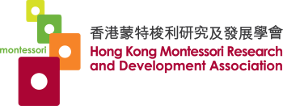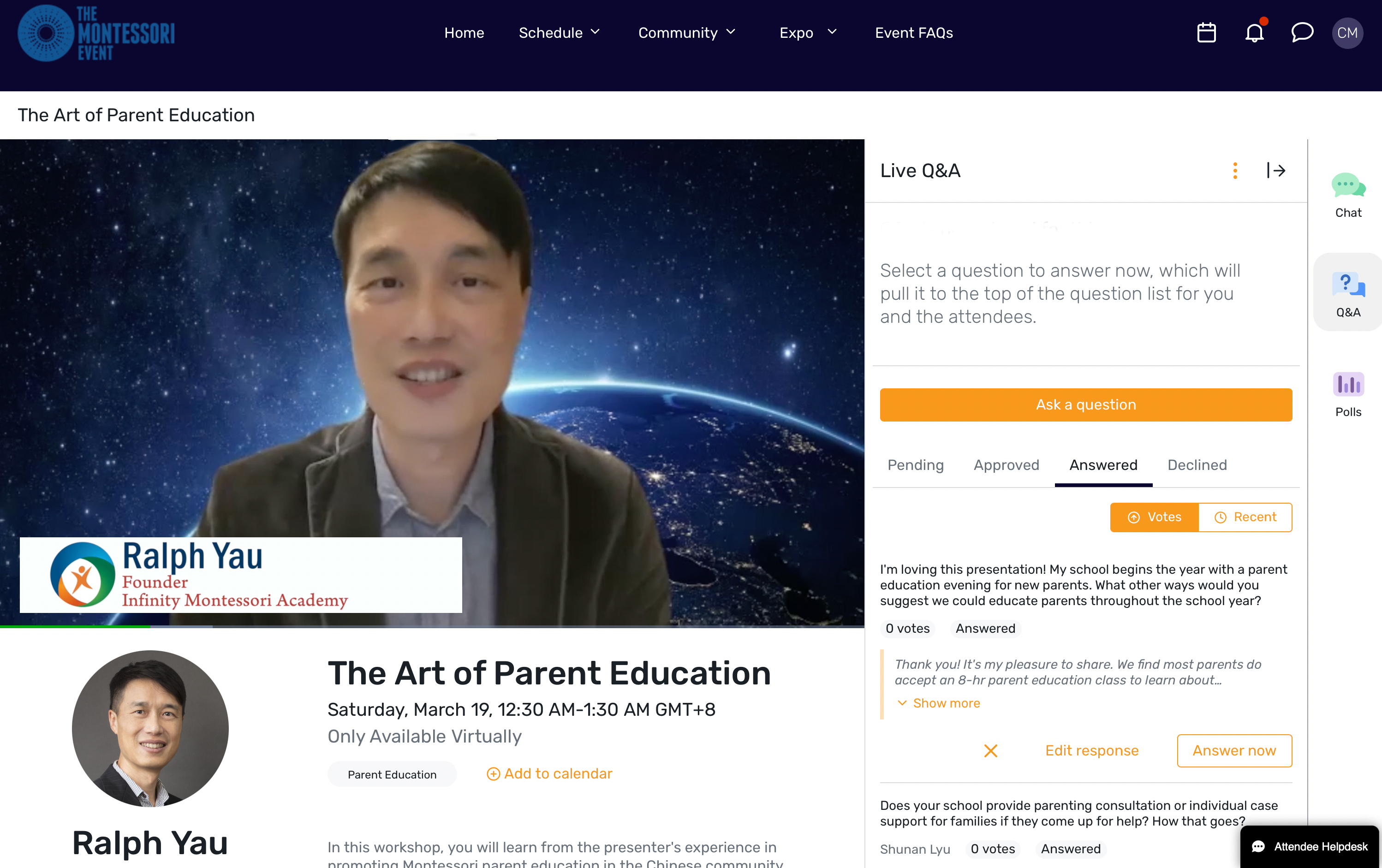【家長教育的藝術】
創會主席邱振明於AMS年會2022演講內容摘要
Why Parent Education?
- The children’s behavior in the classroom is usually a reflection of their behavior at home
- A root cause to this common problem in classroom
- Parents have shared their frustrations and helplessness due to the lack of knowledge and don’t know how to respond to their children’s deviant behavior.
- Some parents are even unaware of how their own behaviors adversely affect their children’s cognitive and social functioning.
- A 3-hour program was introduced in 2006.
- We found that novice parents need at least 8 hours of foundation program and ongoing “practicum”.
The Infinity Way
- Pre-requisite: 8-hour foundation program
- “Practicum”: ongoing child/parent class
- 30-90 hours in-depth extension programs
- AMS Teacher Credential Program
Repertoire of a Successful Parent Education Course
1. Normalization of Parents comes first
- Parents are the first and one of the most important educators of children, thus the key to a paradigm shift in early childhood education must involve them.
- “real preparation for education is the study of one’s self” The Absorbent Mind
- love of work/life, independence, concentration, love of order, coordination, emotionally stable, self-discipline, joy, peace…
2. Relax, Relax, Relax; Observe, Observe, Observe
Relax
- We learn best when our emotions are positive.
- Relax and observe, as Magda Gerber suggested to parents.
- We are in highly commercialized and competitive society. Adults are constantly on edge and our emotions take a toll on our children. City dwellers are even more nervous, just relax and observe seems not enough.
Observe
- Observation is also key to helping adults calm their minds.
- Help to assess whether their intervention is necessary
- Inspired by Montessori, she carefully recorded her observations of children's activities for a long time and used her findings to continually improve her method.
- A scientific approach that allowed her to make a series of unexpected discoveries of child.
- For example, children worked independently, showing great attention, and became satisfied and content after completion. The deviant behaviour she initially observed also disappeared. The children entered "normalization”.
“When nothing is done, nothing is left undone” Laozi, the Taoist
- Do nothing
- Follow the child’s natural development with necessary guidance
- Nothing is left undone.
3. The Discovery of Child and Parent
- Parents often find it difficult to identify appropriate methods or responses to their children.
- Our mission is to act as a bridge between children and parents, by helping parents to understand the children’s developmental needs.
Topics
- The development of mankind follows the “Cosmic Plan”.
- Respect and follow children’s natural development
- Age 0-6 is the crucial stage in the development of human life
- Movement is very important in the development of children and is closely related to the development of physical fitness, memory, cognition, thought and intelligence
- Children require freedom of exploration in a prepared environment that is both safe and challenging which will help them actively construct themselves
- Children will develop good interpersonal relationships in a free and peaceful community
- Age 0-6 have special learning abilities: the absorbent mind and sensitive period"
- The importance of understanding children’s senses, motor, language, cognitive, emotion and social development
- The child naturally moves toward independence since birth.
- Children’s love for activities and work
- Children’s love for order
- Children’s love for the pursuit of perfection
- The hand is a tool of human intelligence
- It is easier to learn in a concrete and real environment than in an abstract and unreal environment
- Spontaneous and active learning based on interest is the most effective
- External rewards or punishments hamper children's initiative
- Parents have indicated that the Montessori parent education program has positively changed their attitudes toward their children and the way they live.
- Many parents also remarked that they have made improvements in terms of their own sensorial, observational, and expressive abilities after the program.
>> Discovery and transformation of adults.
4. Teach a man to fish, rather than give a man a fish
- Parents often want immediate solutions, we rather help them to do it by themselves.
- Guide parents through the thinking process rather than give solutions directly
- Parents are therefore empowered to critically reflect, think and to seek solutions to the problems themselves
- A kind of Socratic dialogue to invite parents to ask questions and think.
- Instead of presenting Montessori philosophy and our observations upfront, the dialogue takes the form of an ongoing discussion and inquire about adults’ preconceptions and reflections on child rearing and education.
- Practice with parents to consider a problem from several different angles to come up with solutions.
- Demonstrate the key to finding the root cause of the problem rather than focusing on the manifestations of the problem only.
- Examine and test the approach in a manner that is as scientific as possible.
- We do not merely refer to the parents teaching their children how to use learning materials, but more importantly, to create materials with Montessori principles and to live and practice Montessori philosophies every day.
- Online lessons?
5. In-Classroom Guidance: Theory and Practice
- 8-hour foundation program
- Child/parent class for 2-5 days per week: Growing together
- Parents observe how their children interact with our guides and the environment, without unnecessary adult intervention.
- Participatory model: Parents learn that they are one of the chief educators of children and participate in education, instead of merely caregivers.
- Parents have to take responsibilities and should not just rely on people they deem “professional” or “authoritative”.
- A year-long “apprenticeship” for parents, helping them to become positive role models for their children, to live and practice Montessori philosophies every day.
6. Constant growth
- Change takes time and requires consistent effort.
- It requires a large degree of effort to make changes and we encourage small steps are to be taken each day.
- In the long-term, it is more important to build momentum for gradual improvement rather than expect an abrupt change which may not be sustainable.
>> Identifying 1 item they will work on each week.
>> Guide parents to improve parenting, their environment, and to build habits that will set them up for success.
>> Discuss on their progress in the next week.
>> This feedback loop helps parents monitor their own progress, so they become accountable for their own growth.
7. The Right Person
- Build basic trust between guides and parents. Some of our parent guides are also parents themselves, which helps connection.
- Have a profound love and respect for children whilst engaging a scientific and rational mind in discovery of children.
- Have extensive experience and solid theoretical foundations in early childhood education.
- Able to explain profound theories in an easy-to-understand language
- Using real and concrete life examples is a to show parents the effectiveness of practicing Montessori.
- Able to bring a wealth of life experience to the parent education program is a bonus.
- Possess mature observation skills, the ability for good analysis and comprehensive judgment, to help parents identify the root cause of the problem and inspire parents to come up with their own solution.
- Know how to read the psychological state of parents. For example, they must attend to the emotions of parents, particularly mothers during and right after their pregnancy, who may face challenges in their emotions. It is important for the parent guide to engage in attentive listening, to understand the challenges and to model a more positive outlook.
- …
8. Remarks
- It is best to start parent education as early as possible.
- Respect that parents know their children the best.
- Always listen to the parents and understand them first. Together with the parents, analyze the problem to find out the main cause. The parent guide can then provide some options for parents to choose from and try, then review the feedback.
- Allow for cultural and personal differences. It is useful to acknowledge that parents’ own personal views and educational concepts may be different from those of parent guides.
- Demonstrate how to handle conflicts peacefully and maintain good communication, dialogue and reflection throughout the program. Remember, change takes time and be patient to parents as you are to children.
- Some cases are beyond our control, may need other professional services, e.g., from doctors specialized in child development, psychiatrists or social workers.

